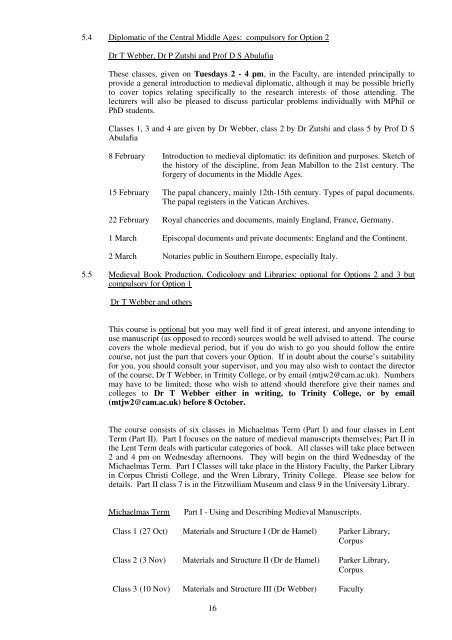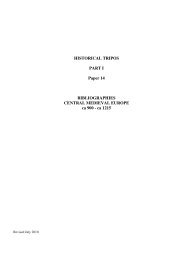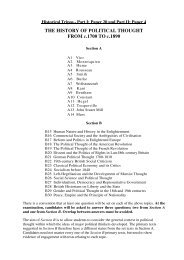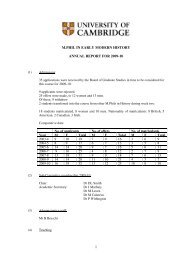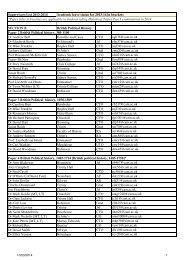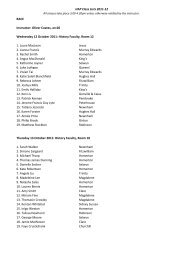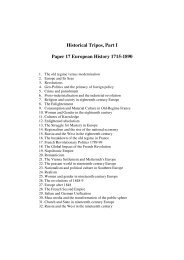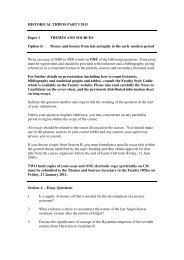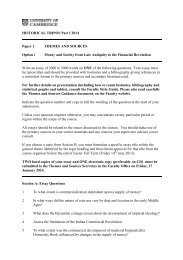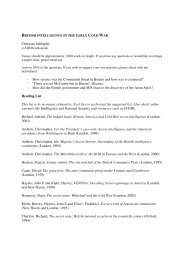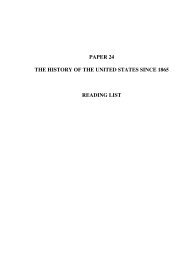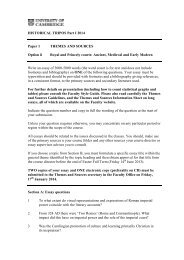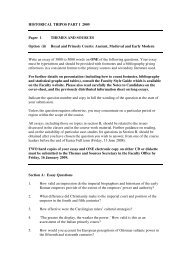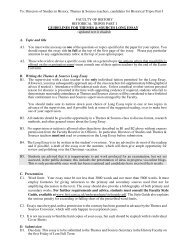Course Handbook - Faculty of History
Course Handbook - Faculty of History
Course Handbook - Faculty of History
Create successful ePaper yourself
Turn your PDF publications into a flip-book with our unique Google optimized e-Paper software.
5.4 Diplomatic <strong>of</strong> the Central Middle Ages: compulsory for Option 2<br />
Dr T Webber, Dr P Zutshi and Pr<strong>of</strong> D S Abulafia<br />
These classes, given on Tuesdays 2 - 4 pm, in the <strong>Faculty</strong>, are intended principally to<br />
provide a general introduction to medieval diplomatic, although it may be possible briefly<br />
to cover topics relating specifically to the research interests <strong>of</strong> those attending. The<br />
lecturers will also be pleased to discuss particular problems individually with MPhil or<br />
PhD students.<br />
Classes 1, 3 and 4 are given by Dr Webber, class 2 by Dr Zutshi and class 5 by Pr<strong>of</strong> D S<br />
Abulafia<br />
8 February Introduction to medieval diplomatic: its definition and purposes. Sketch <strong>of</strong><br />
the history <strong>of</strong> the discipline, from Jean Mabillon to the 21st century. The<br />
forgery <strong>of</strong> documents in the Middle Ages.<br />
15 February The papal chancery, mainly 12th-15th century. Types <strong>of</strong> papal documents.<br />
The papal registers in the Vatican Archives.<br />
22 February Royal chanceries and documents, mainly England, France, Germany.<br />
1 March Episcopal documents and private documents: England and the Continent.<br />
2 March Notaries public in Southern Europe, especially Italy.<br />
5.5 Medieval Book Production, Codicology and Libraries: optional for Options 2 and 3 but<br />
compulsory for Option 1<br />
Dr T Webber and others<br />
This course is optional but you may well find it <strong>of</strong> great interest, and anyone intending to<br />
use manuscript (as opposed to record) sources would be well advised to attend. The course<br />
covers the whole medieval period, but if you do wish to go you should follow the entire<br />
course, not just the part that covers your Option. If in doubt about the course’s suitability<br />
for you, you should consult your supervisor, and you may also wish to contact the director<br />
<strong>of</strong> the course, Dr T Webber, in Trinity College, or by email (mtjw2@cam.ac.uk). Numbers<br />
may have to be limited; those who wish to attend should therefore give their names and<br />
colleges to Dr T Webber either in writing, to Trinity College, or by email<br />
(mtjw2@cam.ac.uk) before 8 October.<br />
The course consists <strong>of</strong> six classes in Michaelmas Term (Part I) and four classes in Lent<br />
Term (Part II). Part I focuses on the nature <strong>of</strong> medieval manuscripts themselves; Part II in<br />
the Lent Term deals with particular categories <strong>of</strong> book. All classes will take place between<br />
2 and 4 pm on Wednesday afternoons. They will begin on the third Wednesday <strong>of</strong> the<br />
Michaelmas Term. Part I Classes will take place in the <strong>History</strong> <strong>Faculty</strong>, the Parker Library<br />
in Corpus Christi College, and the Wren Library, Trinity College. Please see below for<br />
details. Part II class 7 is in the Fitzwilliam Museum and class 9 in the University Library.<br />
Michaelmas Term<br />
Part I - Using and Describing Medieval Manuscripts.<br />
Class 1 (27 Oct) Materials and Structure I (Dr de Hamel) Parker Library,<br />
Corpus<br />
Class 2 (3 Nov) Materials and Structure II (Dr de Hamel) Parker Library,<br />
Corpus<br />
Class 3 (10 Nov) Materials and Structure III (Dr Webber) <strong>Faculty</strong><br />
16


